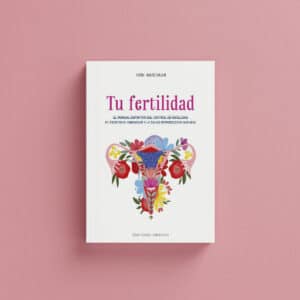Inflammation is the body's natural response to injury or infection. Although it seems like a bad thing, in itself, the body becoming inflamed is not negative. In fact, it is good for our health to be able to inflame correctly because it sets in motion processes that help us deal with certain problems.
But, just as our body must know how to inflame, it must also be able to reduce inflammation in time. If these two processes occur, our health is assured.
However, when inflammation is not “turned off” at the right time, the same mechanisms that previously protected us now turn against us.
Chronic low-grade inflammation
Chronic low-grade inflammation is linked to certain conditions that affect fertility such as endometriosis, adenomyosis, polycystic ovary syndrome, uterine fibrosis, implantation failures or recurrent miscarriages.
It is called 'low-grade inflammation' because in many cases it is not obvious. In fact, we may not even notice it, and not be “sick enough” to stay in bed.
Of course, although this type of inflammation is not disabling, it does not mean that it does not have consequences. The “bill” for that small constant inflammation ends up being paid.
Consequences of inflammation in women
The pro-inflammatory environment can damage embryos and prevent their correct implantation. It can also alter the delicate structure of the fallopian tubes or the oocyte production capacity of the ovaries.
One of the great obstacles to successful embryo implantation and the reason why IVF can fail in certain women is related to a continued inflammatory environment, the result of a pro-inflammatory alteration of the immune system or a situation of autoimmunity.
Certain immune conditions such as celiac disease or Hashimoto's hypothyroiditis cause subfertility (difficulty - not impossibility - of achieving pregnancy) or even infertility. In cases in which the pregnancy does not occur or there are recurrent abortions without obvious physiological causes, the inflammatory factor must be taken into account and how it may be intervening.
Consequences of inflammation in men
In men, inflammation also has repercussions on their fertile capacity. In addition, specific inflammations in the testicles that can damage sperm-producing cells or directly contaminate the seminal fluid with inflammatory agents, low-grade systemic inflammation caused by stress, toxins, a poor diet or lack of restful sleep, It can affect hormone production and lack of libido.
What are the causes of inflammation?
Pathogens such as viruses, bacteria, fungi are the first cause of inflammation, but also wounds, irritations or bruises.
By wound we mean having sores in the mouth, gingivitis-periodontitis or gastritis in the stomach...
And fungi can be on the skin, on the feet, in the vagina or in the mouth. If we have animals or live with small children, the presence of parasites is quite common. They are not serious situations but they must be treated to put an end to them, if the body has not done so on its own.
Toxins such as tobacco or environmental toxins also generate inflammation.
Less well known as causes of inflammation are excessive exercise, incorrect diet or stress sustained over time.
That is, if you live in a big city, you are stressed at work, you don't have time to cook at home and you catch colds every now and then... you are inflamed.
What to do to avoid inflammation and improve fertility?
With a specific analysis, non-specific pro-inflammatory markers can be known (C-reactive protein, Blood Sedimentation Rate, Interlukin6 levels).
That means you know there is inflammation, but it doesn't tell you where.
Once an inflammatory state has been identified, we should not rely exclusively on taking medication to repair it, but rather we must review the lifestyle habits that have led you to this situation. And change them!
In fact, medications to alleviate low-grade inflammation (ibuprofen, aspirin or prednisone) are designed to be used in acute moments of inflammation, but not for pathologies that last over time. These medications can negatively interfere with the body's natural immune response, also causing other undesirable side effects.
The best advice is to review your diet, lifestyle or stress level, since all three factors are very powerful in stopping inflammation… or causing it!
On the other hand, alternative medicine treatments such as acupuncture have been shown to have positive effects on inflammation, anxiety and immunological alterations.
What is an anti-inflammatory diet to improve my fertility?
Let's focus today on diet, since it is within everyone's reach to make interventions at this level. There are foods that directly cause inflammation (although it will depend on the person if they cause more or less inflammation), and there are foods that, on the other hand, reduce systemic inflammation in the body.
The recommendation is to reduce or avoid the former and enhance the latter in our usual diet.
Anti-inflammatory foods
- Blue Fish: contains levels of omega 3 fatty acids that help counteract the inflammation of other dietary products such as omega 6 fatty acids. These fatty acids are very present in the Western diet (rich in red meat from stable animals and rich in very simple carbohydrates). processed). LINK Omega 3 Nutravita
- Nuts such as walnuts or Macadamia nuts, which are rich in Omega 9 and seeds such as flax, chia or hemp.LINK Happy Belly macadamia
- Fruits and vegetables: rich in antioxidants that help neutralize free radicals, responsible in many cases for inflammation. Orange and dark green vegetables would be the most interesting because they are rich in beta-carotene. LINK Betacarotene Solgar
- raw olive oil, Rich in Omega 9 and oleocanthal (phenolic component), both very anti-inflammatory. But be careful! Olive oil heated to high temperatures becomes inflammatory. Less than other vegetable oils subjected to heat, but also pro-inflammatory.
- spices such as turmeric, garlic, ginger, rosemary. They are capable of neutralizing the action of certain pro-inflammatory enzymes in the body.LINK Curcumin
- Cocoa or dark chocolate: Laboratory studies have shown that these compounds slow down the signaling of molecules involved in inflammatory processes. The trick to making it healthy is not to add too much sugar and undesirable fats.LINK: Organic raw cocoa nibs
- Apples, onions, red fruits, brassicas (cabbage), capers... all of them rich in Quercetin, an important antioxidant and anti-inflammatory. LINK Quercetin Solgar
- Fermented foods: like Kimchi, Sauerkraut or Sauerkraut, Kefir, Kombucha or even yogurt -better coconut than cow's milk-. The state of intestinal health is essential for the control of systemic inflammation .LINK Captain Kombucha
- Other foods such as green tea, pineapple or propolis (bee resin) have been shown to interfere with long-term inflammatory processes.LINK Propolis
- Vitamin D and foods rich in it, such as fish oil, shellfish, mushrooms or egg yolk.LINK Vitamin D3
- Coconut oil: with saturated fats beneficial to our health, thanks to lauric acid, present in breast milk, and caprylic acid with antibacterial and healing properties. LINK Organic coconut oil
- The Vitamin A and products that contain it such as organic liver and free-range eggs. LINK Vitamin A
In addition, it is interesting to eat more white fish, seafood and poultry before red meat, always paying attention to the origin and way of raising the animals.
Farmed salmon does not have Omega 3. For it to have it, it must be - and put on the packaging - wild salmon.
A stable, overcrowded and hyper-medicated animal will be highly inflammatory for our body. An animal that has grazed and moved, in addition to consuming feed, will be a more tolerable animal for our body.
Dairy products, as well as red meat, are rich in arachidonic acid, a necessary fatty acid but which, in excess, is very inflammatory.
Inflammatory foods to avoid to improve fertility
Now you may be wondering... And what should I avoid in my diet? The foods to avoid probably won't surprise you.
We are aware that they are not good for our health in general (not just for fertility), but we all end up consuming them at some point.
Our frenetic lifestyle, the advertising bombardment, the placement of products in supermarkets... everything works in our favor for us to consume these types of products.
The reality is that we cannot say that they are harmful in themselves to health, but we must understand that they should involve occasional consumption and not be the basis of a person's diet.
We refer to:
- refined carbohydrates: flours, cookies, breads, pizzas, pastries... There is no good cookie! The reality is that they are not a product for daily consumption.
- Sugars and sweeteners: which are present as preservatives in almost all products, and as flavor enhancers in others. As an example, a ham with sugar sells more than one without it because it tastes better and is consumed more.
- Highly processed and processed foods. To simplify: all those that have a very long list of ingredients.
- Vegetable oils subjected to high temperatures: All vegetable oils in baking are damaged by heat and converted into trans fats.
- Hydrogenated fats from margarines and desserts. Hydrogenation provides a creamy, unctuous consistency to foods, at the cost of our health.
- Caffeine, tobacco and alcohol.
Last but not least, stress.
It is not a food, but it is a very important factor in reducing inflammation in our body.
The ideal would be to eliminate stress, but since this is an almost impossible task, it would be desirable to learn to deal with it.
The physiological response to stress is the production of glucose and other pro-inflammatory substances. If we maintain stress over time we will be doing ourselves a disservice to our fertility.
In short: following an anti-inflammatory diet and reducing stress help improve both female and male fertility. Here we also leave you this article so you can read about the importance of diet and sperm quality: Nutrition and improvement of sperm quality and this envelope the importance of the microbiota in our general health and when we seek pregnancy.
Books that I recommend:
It may interest you:



